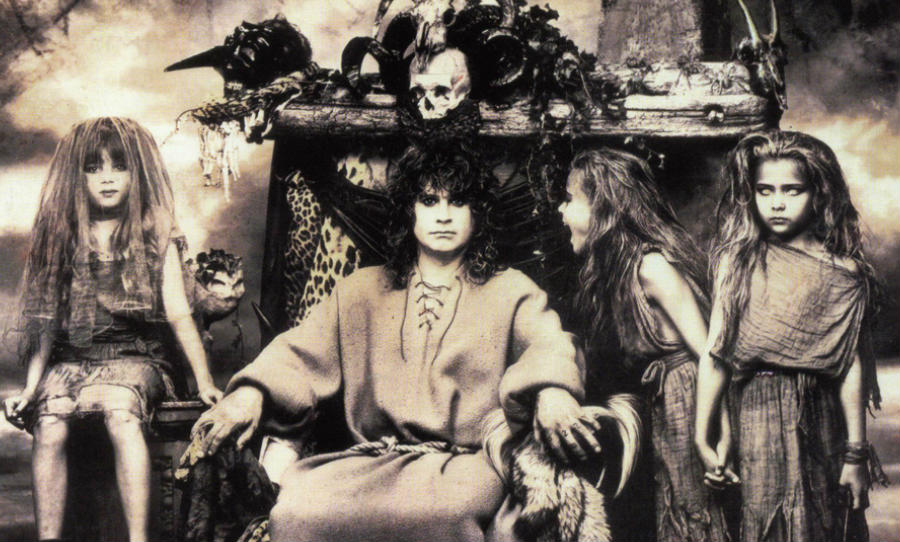Indigo De Souza reflects on her sophomore album Any Shape You Take and the lessons we learn from trusting our intuition.
The North Carolina native spoke about her diverse range of inspirations and how working on her album Any Shape You Take made her realise the impact that different energies can have on our growth.
Happy had the chance to gain insight into the experiences that shaped De Souza’s latest album, including living off the land with friends, ending unhealthy relationships, and creating music that is emotionally varied in order to reflect human nature.
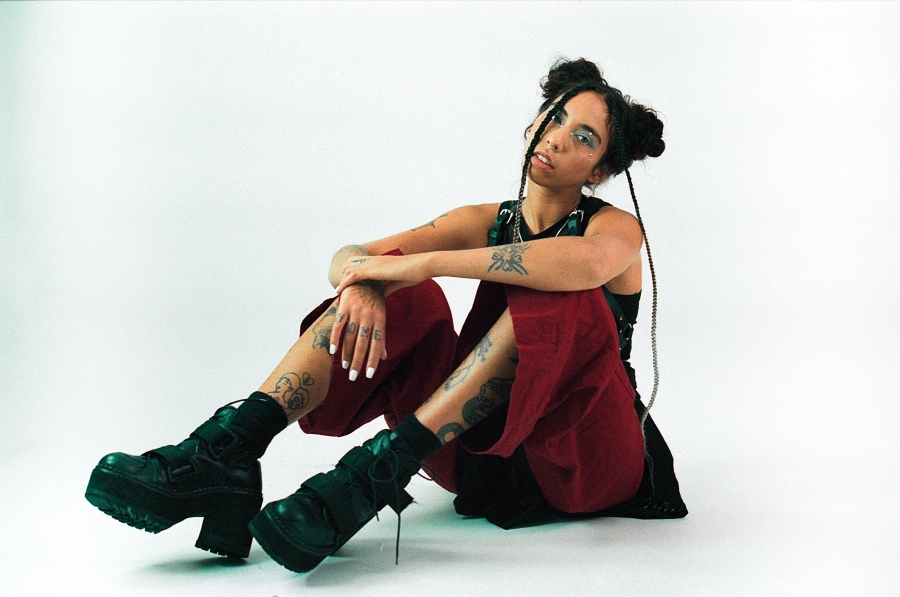
HAPPY: How are you?
INDIGO: I’m good, how are you doing?
HAPPY: Yeah, good, thanks. How’s everything where you are? Where are you right now?
INDIGO: I’m just at my house right now, which is a little bit outside of Asheville. Yeah, it’s pretty nice. It’s been raining a lot and it’s just kind of wet and vibrantly green today.
HAPPY: Oh, lovely. Yeah, where I’m at, it was a very clear morning but now the clouds are starting to roll over. But yeah, how have you been anyway? How is the COVID situation where you’re at?
INDIGO: I’ve been all right. The COVID situation is kind of continuously confusing. I think it is for everyone. But it’s OK. It just is what it is. I feel it’s completely out of my control, so I just have to kind of accept whatever iteration that we’re in.
HAPPY: Yeah, I definitely feel the same way. What’s been one of those things that have kept you sane in these sorts of times? And how have you been keeping yourself busy?
INDIGO: I’ve just been kind of hanging out with my pod of people a lot, and just trying to dance a lot and play music and listen to music and draw pictures, and just kind of like engage with things that make me happy as much as possible.
HAPPY: It’s so important. Like most mornings, I like to start off with a little bit of dancing. It just makes a big difference to my day and my overall mood, I’ve noticed. And just becoming more in touch with my body and everything. I think we get so side-tracked sometimes with fast-paced living these days, it just becomes very easy to have a disconnect between your mind and body. So you have to have that routine as well.
INDIGO: Yeah, I think dancing is so important, and I’ll often kind of forget how important it is for a little while because I’m kind of disconnecting from my body and just droning in a certain way and then I’ll remember that I should try to dance. Like even if I’m in a low kind of mood, then I dance. It just changes everything and connects me to my body again.
HAPPY: Yeah, it’s amazing. I love it. So, talking about your sophomore album, Any Shape You Take, I know you said it was sort of a hodgepodge of newer songs like Pretty Pictures and older songs written during the I Love My Mom era. How does it feel listening back on these pieces, considering you feel that they represent a different person than who you are right now? Because you have mentioned in the past you sort of feel like you’re ever-changing, as I feel a lot of people would feel, but they’re not really aware of it. So, what’s it been like listening back on those older versions of yourself?
INDIGO: It’s been nice. The songs never really get old to me. I think maybe it would take a little longer or just maybe it takes a lot of touring and a lot of playing the songs over and over again to be completely tired of them. But right now, when I listen to the album and experience playing the songs, I feel connected to those iterations of myself still, and I just feel kind of tender-hearted towards them because I grew so much out of that period of my life. It’s just really special that I am where I am now, and I wouldn’t be where I am without having gone through all the things that I’ve been through. So, I feel grateful for my experiences and for the songs I wrote about the experiences that helped me along the way. Yeah, and Pretty Pictures, is the newest one that’s actually very recent. It was kind of an add-on to that album and that one, you can kind of tell that the writing is a little different, but I love the way it complements the other songs.
HAPPY: I think as a body of work, it just shows that people are diverse and we don’t have to, I guess, stick to a certain way of being – it’s nice. It’s quite liberating when you listen to it. I thought it was quite a nice reflective piece as well. I guess the songs themselves are like timestamps? And, you know, you can go back and reflect and remember things that made you who you are. I feel like, it would be almost meditative when you get to do that and perform that.
INDIGO: Yeah, for sure.
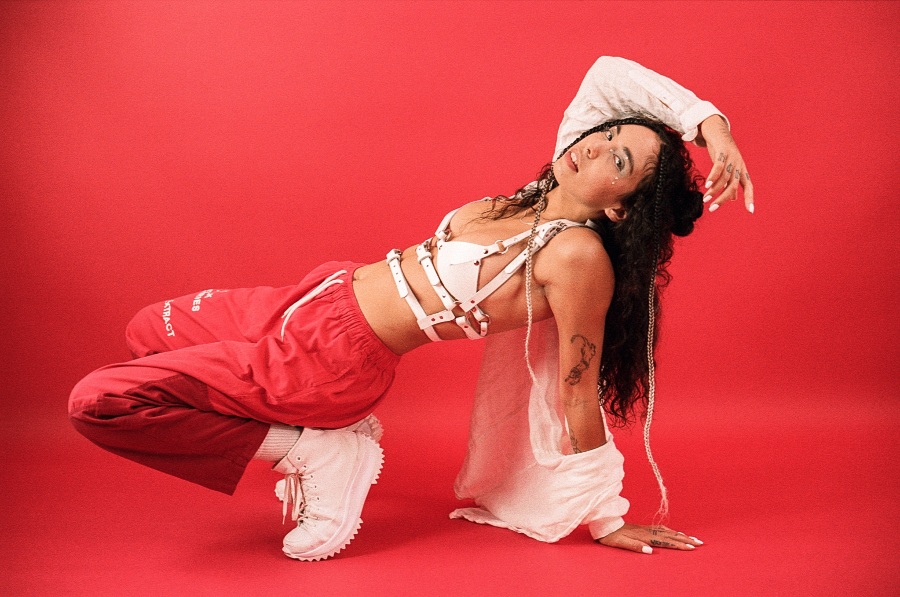
HAPPY: You’ve said in the past that you don’t really like to… you don’t think that your music embodies a particular genre and I guess that’s a way for you to not feel restricted in your creativity as well. Would you say, or am I projecting a bit there?
INDIGO: Oh, no. Yeah, definitely.
HAPPY: You’ve said as well that your music is influenced by your ever-changing environment and what’s going on in your life. So, are there any environments that you might subconsciously gravitate towards when you are writing your music? Like, are there certain things that you might respond to more and pick up on that inspire you to write particular things?
INDIGO: Well, it’s a hard question to answer, because I think that the way I write songs is kind of like I’m soaking up things that have been around me, and people that I experience and things in my life, and then I kind of retreat to an inward space to write the song. So, it’s like first I’m soaking up an experience, and then I’m kind of processing it in a songwriting space. So, I think that when I’m actually writing the song, physically writing the words down and fully embodying whatever I want to express, I definitely am usually by myself, and I have a guitar or a keyboard or something. I just kind of isolate myself and fully embody the thing.
HAPPY: So would you say, what is your ideal sort of songwriting space then? Just to be alone, anywhere in particular?
INDIGO: Yeah. I’ve found that it can just be anywhere, like the only thing I really need is the feeling. There’s like a certain feeling in my body where I can tell that I’m focused on words, and that words are coming easily to me, and that I am just kind of shifting through language in my head in a way that’s helpful for songwriting. I can tell that I’m focused on the feeling that I’m embodying and that I am present with it and if I feel all of those things, then I know that I can be anywhere with my guitar and I can write the song. But if I’m kind of unfocused, then I usually don’t even try to go to that space because I know that nothing’s going to happen.
HAPPY: And also, you wouldn’t want to… I guess for me, I feel like I get creative in certain spaces. And like you said, if you’re not feeling that sort of creativity, for me, I don’t like going to the space because I don’t want to taint it with like, I guess, procrastination. It’s a place that I respect as a creative sanctuary in a way. So, I usually tend to avoid those places if I’m not feeling inspired or motivated because I don’t want to change the dynamic there. I don’t know. It’s probably like a subconscious thing, I guess. But I’ve definitely noticed that I’m more creative in certain places.
INDIGO: Well, yeah, I think I’m maybe somewhat that way. But also, I try to write songs even when I’m not feeling in the mood. Like if I have extra time and I’m just at my house, I’ll go sit down and just play around with sounds or write words that maybe I will never use or maybe I don’t like at all. But it’s just helpful to have the practice of exorcising the thoughts in my head. So, yeah, I go back and forth. But yeah, it’s a good practice for me. I should do that again. I haven’t been doing that lately.
HAPPY: That’s cool though. It’s good that you’re aware of that, so you can definitely pick back up on it. So, going back to the environment, North Carolina is a beautiful place. I was actually about to study there for university, and I was looking at it, specifically Chapel Hill. But it’s surrounded by nature. It feels very much like a simulation – in a good way – from what I’ve seen. It’s just beautiful. So, I did see that you had moved to a nearby church in the woods. I’m not sure if you’re still there but how is that accessibility to nature? Is it very important to you to have that, and also does it seep into your artistry in any way?
INDIGO: Yeah, so before I lived in the city in Asheville, and I had neighbours all around me, and I felt disconnected from nature because if I wanted to go on a hike or to a river, I would have to drive like an hour away from where I lived. A lot of my friends lived out where I live now, and so I decided to just move closer to them. A lot of my friends out here are farmers and just know how to live off the land, and know a lot about the land in a way that I never have. So it’s offered me a really cool space to learn. Yeah, it does feel really important, especially during the pandemic. I think a lot of people just wanted to be closer to nature because nature is just so much more reliable and more life-giving than people can be at times. The church has been really important for me, just as a gathering space for my friends and for community and for building connections with people and allowing a safe space for expression. Yeah, it’s been really good.
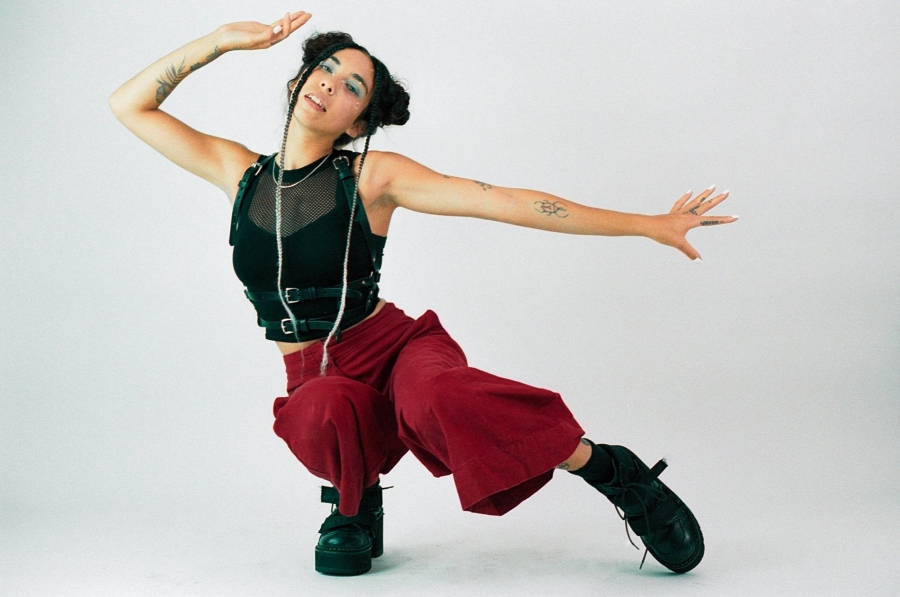
HAPPY: That’s so cool. I think it would be nice for people to have that respite from the hustle-bustle of everyday life and just be able to retreat into those really peaceful environments, and just get back in touch with who they are as a person. So I think that’s lovely that you’ve had that opportunity, and have that opportunity to do that with close people in your life, and people that mean something to you. Yeah, it just seems like a very healthy environment. I was going to ask as well, you have previously mentioned that you feel like a shapeshifter with your music, and Any Shape You Take is a reflection of accepting people for the many shapes they take throughout their lives. What experiences or experience in your life has made you conscious of this human tendency to continuously shapeshift? Because I feel like a lot of people aren’t really in tune with that, and you seem to have a very strong understanding that people change and people are constantly growing. So, what was one of those foundational experiences that really hit home with you and made you realise that?
INDIGO: I think probably the biggest thing is that I went through a very bad breakup, and I was in a relationship for a very long time, and I completely lost my identity to the relationship and was kind of just very co-dependent and very ill. It took a lot of strength for me to leave that relationship and decide to find my identity again and connect with myself and care about myself and take steps to be healthy. I think something about that experience of coming from just such a raw state of confusion into a state of self-love and self-care is one of the biggest teachers, just because I changed so much throughout that experience. The people in my life also shifted around me because I was changing, and they knew me as one thing and they were attached to this one thing that I had been. As I became something else, I had lost people along the way, and then I also gained people – I gained these new people in my life who were there to hold me and my new iteration. They were just so celebratory of me, and accepting of how I was, and I realised that the reason why people in my life after that had been treating me so well and being so sweet to me and raising me up in such a way, is because I was doing that for myself. And I hadn’t been for my whole life. So, I think that was the greatest shift I’ve ever been through, and it just taught me a lot about what kinds of energies I allow into my life and what kind of boundaries I can hold with people. I just realised how beautiful change was and how all I wanted to do for other people was to offer them space to change in whatever ways they want, and to feel held and accepted in those spaces, and to just feel like it’s OK to actually express yourself and love yourself and feel joy.
HAPPY: Yeah. That feeling, when you had that realisation as well must have been so liberating, as though a weight had been lifted off, because you’re finally in an environment with people who were nurturing and they weren’t inhibiting you and restricting you in any way. So, yeah, I can definitely relate to being around… like the power of surrounding yourself with certain people. It’s incredible how much it can change you, and giving yourself that that time away from people is so important because it really brings you back to who you are at the core as well, and what you want. It makes you listen to yourself more without anyone else’s influence.
INDIGO: Exactly. And it gives you the power to actually choose yourself.
HAPPY: Yes. It’s so, so important. I definitely noticed that, especially during COVID, like having that distance from certain people that I was continuously seeing, that space made me realise like, ‘OK, I’m quite a positive person at the core’, and I was around some people who were quite negatively draining, and I had no idea… it’s crazy. Like you’d think you would, but I had no idea of how just drained I was from being around them, it was insane.
INDIGO: Yeah, wow, I had a very similar experience. Like I feel like my whole life, I’ve kind of surrounded myself with people who romanticize depression because I’ve always had depression and anxiety in a pretty intense way. So, I thought that I needed people around me who were just focused on that. But yeah, now I’ve kind of had that same realisation like, yes, I have a mental illness, but also, at my core, I am a very happy person, and I have a lot of joy and light to spread. So, if I’m surrounded myself with people who are, who are so dark and focused on the darkness, I will not be able to flourish in the light.
HAPPY: Yes, that’s a beautiful way to put it, too – it’s so true. It’s great when you realise that and you can just tap into all these different parts of yourself that hadn’t been tapped into before or unlocked – the potential is just endless after that point! Talking about the future direction of your music after this kind of experience, you did mention before that you were tapping into more poppy sides of your music style and signing with Saddle Creek, and getting that exposure to different types of technical resources and tools helped to further express yourself. What’s the future trajectory for your upcoming music?
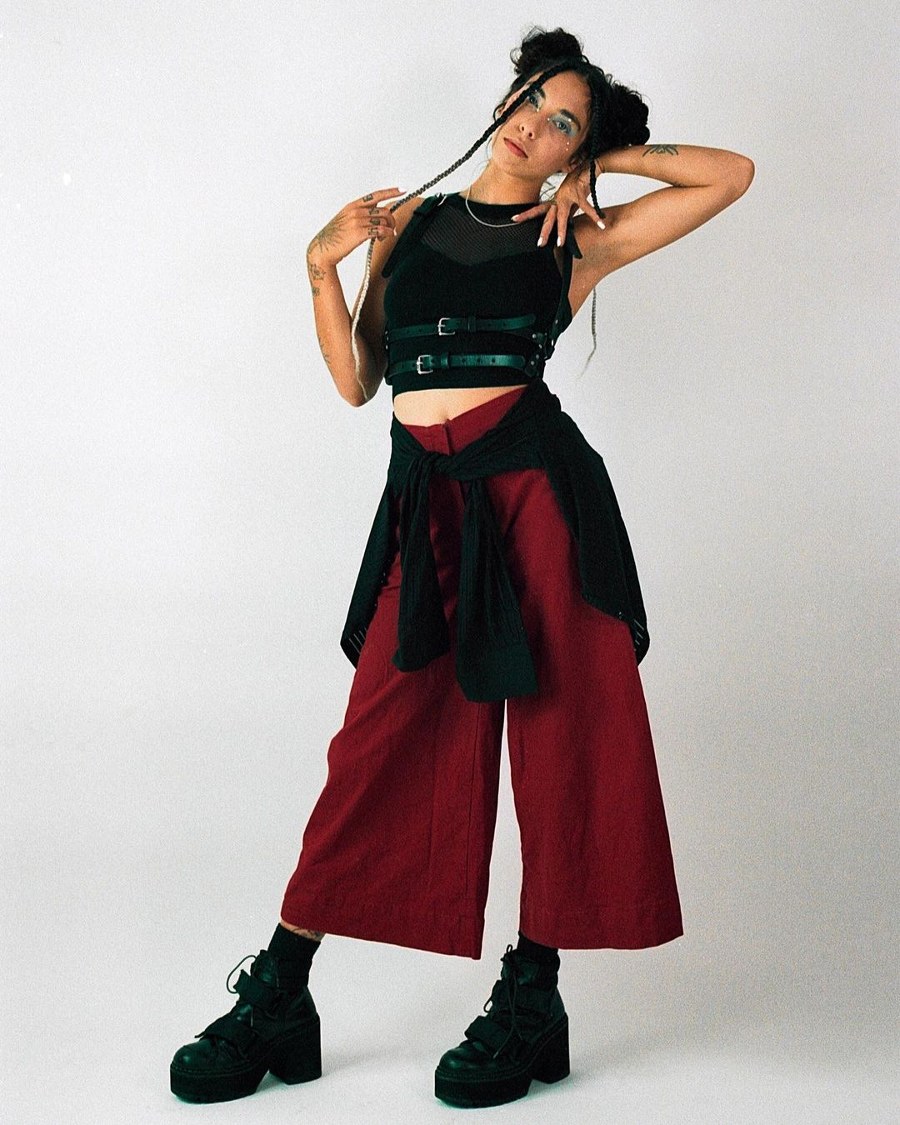
INDIGO: I don’t know. I really just intuitively flow with whatever kind of thing I’m feeling and yeah, it’s so funny how in interviews and stuff, people try to understand why I am specifically floating through these different genres, and if I’m doing it on purpose and where am I drawing influence from, and I don’t know. It’s funny to be asked those questions because I truly think I just listen to a lot of different kinds of music and I like to dance, and I like joy, but I’m also sad and I’m also heartbroken. All of those things just kind of exist in the same space, in the same way that a mixture of genres do. It kind of just feels like it comes from like an emotional landscape that is just up and down.
HAPPY: That’s cool though, because it’s very real in that way. And I mean, I guess it mirrors the every day – we’re not always feeling our happiest or most positive – so, it’s nice to know that you would be, I guess, writing based on what you’re feeling in the moment. That in itself is incredibly relatable for so many different people – to have someone make music based around that. That would be a great way for people to realise that it’s OK to be indifferent headspaces every day. Like it’s just the way we are. We’re complex as humans, so there shouldn’t be a set guideline of how you should be functioning every day. That’s just not possible. Yeah, I guess the future direction of your music is just going to depend on so many different things in your life, like who you’re around, what music you listen to. Like it’s not just like one set of inspiration, it’s a stream of them, which is awesome.
INDIGO: Yeah, precisely.
HAPPY: You seem to come from like a very creative background – your mum’s an artist, your dad is a bossa nova guitarist, and I know you have said that you feel that is just naturally part of you, that sort of inclination to be very musical. But I did also notice that your mum, she created the album artwork for both of your albums, which is so cool. I love that. It’s like a collaborative project between you and your mum. Would you ever consider a joint visual art project with her, like a graphic album where she might create an artwork, and then you might write a song about that specific artwork and vice versa?
INDIGO: Yeah, that’s a cool idea. I definitely haven’t thought about anything specific like that, but I have thought of making a zine, because I really like to write poetry too, and I have poetry that I want to publish at some point. So, it would be cool to do that with her.
HAPPY: Yeah, that would be sick. I think forming those two disciplines would be amazing. I know my brother and I, we did something similar because I like to make art as well, and he loves to write music. Definitely a moment where I felt creatively dehydrated, I guess. And I was just like, ‘I’m frustrated, I want to express myself.’ And he’s like, ‘why don’t you create artworks? And I’ll write a short snippet based on what I interpret from them.’ And I was like, ‘OK, cool.’ So we did like a mini art project/music project.
INDIGO: Oh, that’s so cool.
HAPPY: When you’re writing your songs, are there like other forms of creative expression like films and books that can influence that creative process? I know you said before that it is very much influenced by your environment and that sort of thing, but do other forms of creative expression play into your songwriting as well?
INDIGO: I’m not sure. I don’t know. I used to watch more movies. What’s wild… what’s been really interesting about being in the music industry now and in a very present kind of way is that I’m so busy all the time, and there’s always so many things happening that I don’t have as much time to kind of like dive into books and movies and media in the same way that I used to. It feels like all the extra time that I have, I’m spending either resting and taking care of myself or just trying to pour energy into my relationships, my friends, and my family. So, it feels like a lot of my inspiration mostly just comes from conversations with my friends and family and loved ones. Yeah, I feel very inspired by what other people are learning about the world and what we’re learning together.
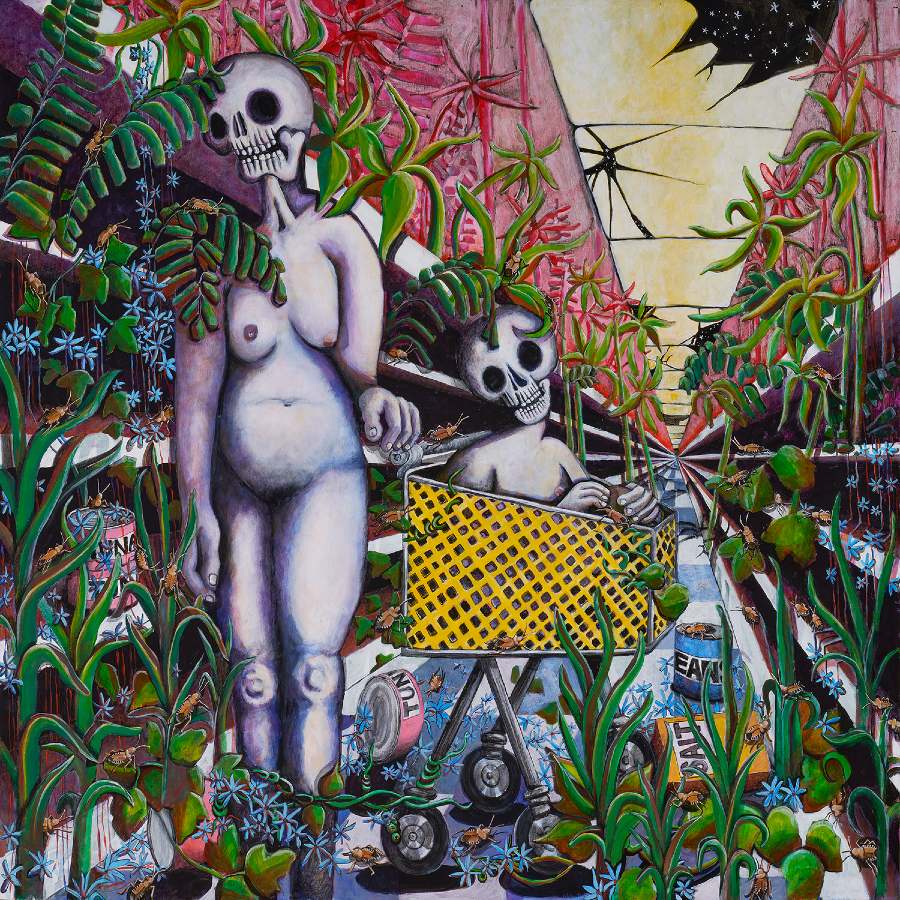
HAPPY: Yeah, lovely. So, it definitely feels like a hand-in-hand sort of relationship. It is important to draw from healthy inspirations too. I just wanted to ask as well, was there any other information you want to share that I might have not like touched upon, or questions I might have not asked?
INDIGO: I don’t know. I never really know what to say when people ask me that.
HAPPY: That’s OK. I feel like that’s all the questions I had for you. I loved the album and I can’t wait to see what you do in the future. I feel like this is really only the beginning. It’s exciting stuff.
INDIGO: Thank you. Yeah, I feel very excited, too.
HAPPY: That’s lovely. Well, thank you so much, Indigo. It was really quite a pleasure to talk to you. And I’m really grateful that you took the time out to speak to me today and letting me interview you.
INDIGO: Thank you so much. I hope I can come to Australia sometime.
HAPPY: Oh my God, that would be awesome. Anyway, once all this stuff calms down, who knows? But yeah, just keep doing what you’re doing because there’s so many more amazing things that I sense you will do. Good to meet you.
INDIGO: Lovely to meet you, too.
HAPPY: Have a good one.
INDIGO: Thank you. Bye.
HAPPY: Bye.
Any Shape You Take is out now on all streaming services!
Interview by Alex Stefanovic.
Photos Supplied.



